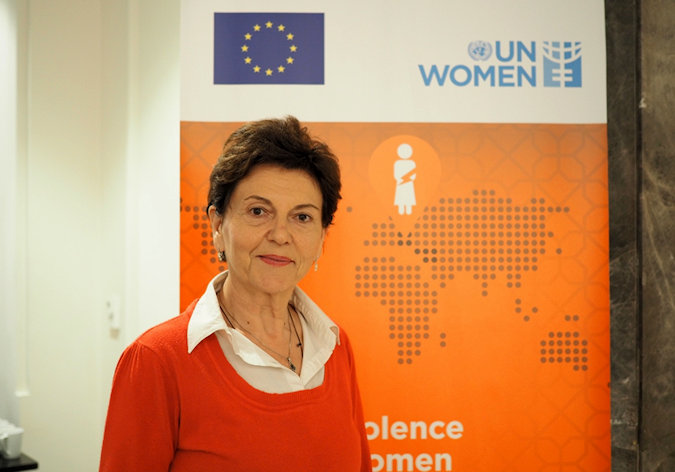Take Five: “The media in Serbia can make a major contribution to the fight against gender-based violence”
Date:
Radmila Veskovic is a project manager of NGO Fenomena, a non-profit organization working to advance women’s rights in local communities across Serbia. She’s currently leading a project focused on working with journalists to reduce harmful gender stereotypes in the media coverage of news related to violence against women under the EU-UN Women regional programme “Implementing Norms, Changing Minds”.

The media are considered a key pillar in fighting violence against women. How would you assess the media coverage of cases of violence against women in Serbia?
Media coverage of cases of violence against women in Serbia is quite sensationalistic, as it is the case in the Western European countries. There is a tendency of neglecting the media ethical code by exposing names and other explicit details from people’s private lives, which are mostly irrelevant to the story. In addition to this, cases of violence are reported as individual events rather than treating domestic violence as a social problem; the focus is on sensational details to grab the audience instead of on prevention and the prosecution of perpetrators. However, there seems to be a positive trend in Serbia in the past couple of years – more analytical articles on violence against women, representatives of women’s organizations are more present in the media, politicians are more and more strongly condemning cases of violence against women and the like… All of this gives us hope that the media can be our partners in fighting violence against women.
How do you plan to work with media representatives to ensure ethical and gender-sensitive coverage of violence against women?
We will conduct workshops for journalists in charge of the daily coverage of crime news. This is one of the most problematic areas, as cases of violence against women are often reported on crime pages. Some of the headlines read like this: “He killed a woman for no reason”; “Bizarre incident in Kucevo; He was a quiet man and a good neighbor”.
I don’t believe that journalists and editors are making these mistakes on purpose, but rather they are just not thinking about the messages they are sending with such headlines. Therefore, through workshops, we will provide concrete examples and address how to prevent making similar mistakes in the future, and we will suggest topics of social interest to focus on when reporting on violence against women. Following the workshops, the plan is that each participant journalist publishes at least two analytical stories and at least four articles promoting the number of the SOS hotline. This way, we expect to contribute to improving the public’s understanding and awareness about the issue while also sending the message that no woman should suffer from any form of violence and that violence should be reported.
In your opinion, why is it important to work with the media?
The media contributes to shaping public opinion about all aspects of social life, including violence against women. Public opinion always puts a certain pressure on the state and the community. The media in Serbia, as in the rest of the world, can make a major contribution to the fight against gender-based violence by making it visible, framing it as a social problem rather than a private problem of the survivor, creating public pressure on the state to solve this problem, and emphasizing the unacceptability of violence against women to the public.
However, many media outlets continue to follow unethical practices in their coverage, which means that there is room for change.
Press coverage of gender-based violence often compromises the privacy and integrity of individuals. How do you intend to tackle this issue in your work?
Protecting the survivor's identity is one of the most important things when it comes to media coverage of cases of violence against women. Some media outlets are not treating survivors' or perpetrators' private lives with care. We have come across absurd cases where the survivor's identity is protected, but they show a mildly blurry picture of her house, family members, workplace or school. This is one of the issues we will be focusing on during our workshops. We will remind journalists of the laws, journalistic code of ethics, and personal ethics. The change of practices in this field will be slow, but we believe it's achievable.
Aside from working with the media, in your opinion what are other priorities to end violence against women in Serbia?
It is of key importance to work with girls and boys from an early age. Also, state institutions are obliged to respect the law and women survivors of gender-based violence must feel that state institutions are on her side. In these situations, she also needs to have a safe place to go with her kids. This is why it is important to strengthen women NGOs and open safe houses for women and children who experience of violence.